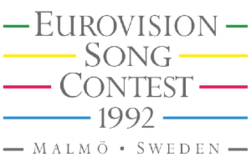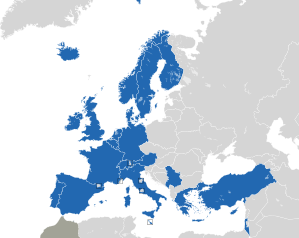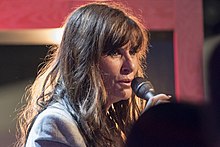
The Eurovision Song Contest 1968 was the 13th edition of the annual Eurovision Song Contest. It took place in London, United Kingdom, following the country's first victory at the 1967 contest with the song "Puppet on a String" by Sandie Shaw. Despite having won for the first time the year before, it was actually the third time that the United Kingdom had hosted the competition, having previously done so in 1960 and 1963, both of which also took place in London. Organised by the European Broadcasting Union (EBU) and host broadcaster British Broadcasting Corporation (BBC), the contest was held at Royal Albert Hall on 6 April 1968, and was hosted by Katie Boyle for the third time. It was notably also the first time that the contest was broadcast in colour.

The Eurovision Song Contest 1995 was the 40th edition of the Eurovision Song Contest, held on 13 May 1995 at the Point Theatre in Dublin, Ireland. Organised by the European Broadcasting Union (EBU) and host broadcaster Radio Telefís Éireann (RTÉ), and presented by Mary Kennedy, the contest was held in Ireland following the country's victory at the 1994 contest with the song "Rock 'n' Roll Kids" by Paul Harrington and Charlie McGettigan. It was the third consecutive contest to be held in Ireland – the first and only time in the history of the event that a country has hosted three editions in a row – and the second consecutive edition to be held in the Point Theatre in Dublin.

The Eurovision Song Contest 1994 was the 39th edition of the Eurovision Song Contest, held on 30 April 1994 at the Point Theatre in Dublin, Ireland. Organised by the European Broadcasting Union (EBU) and host broadcaster Radio Telefís Éireann (RTÉ), and presented by Cynthia Ní Mhurchú and Gerry Ryan, the contest was held in Ireland following the country's victory at the 1993 contest with the song "In Your Eyes" by Niamh Kavanagh. It was the first time that any country had hosted two successive editions of the contest, following the previous year's contest held in Millstreet.

The Eurovision Song Contest 1993 was the 38th edition of the Eurovision Song Contest, held on 15 May 1993 at the Green Glens Arena in Millstreet, Ireland. Organised by the European Broadcasting Union (EBU) and host broadcaster Radio Telefís Éireann (RTÉ), and presented by Fionnuala Sweeney, the contest was held in Ireland following the country's victory at the 1992 contest with the song "Why Me?" performed by Linda Martin.
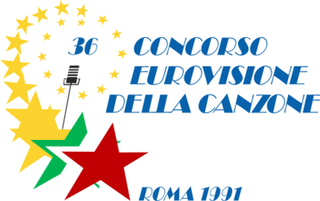
The Eurovision Song Contest 1991 was the 36th edition of the Eurovision Song Contest, held on 4 May 1991 at Stage 15 of the Cinecittà Studios in Rome, Italy. Organised by the European Broadcasting Union (EBU) and host broadcaster Radiotelevisione italiana (RAI), and presented by Gigliola Cinquetti and Toto Cutugno, the contest was held in Italy following the country's victory at the 1990 contest with the song "Insieme: 1992" by Toto Cutugno.

The Eurovision Song Contest 1990 was the 35th edition of the Eurovision Song Contest, held on 5 May 1990 in the Vatroslav Lisinski Concert Hall in Zagreb, Yugoslavia. Organised by the European Broadcasting Union (EBU) and host broadcaster Radiotelevizija Zagreb on behalf of Jugoslavenska radiotelevizija (JRT), and presented by Oliver Mlakar and Helga Vlahović, the contest was held in Yugoslavia following the country's victory at the 1989 contest with the song "Rock Me" by the group Riva. It was the first contest to be held in the Balkans and the first to be held in a socialist state.

The Eurovision Song Contest 1985 was the 30th edition of the Eurovision Song Contest, held on 4 May 1985 in the Scandinavium in Gothenburg, Sweden. Organised by the European Broadcasting Union (EBU) and host broadcaster Sveriges Television (SVT), and presented by Lill Lindfors, the contest was held in Sweden following the country's victory at the 1984 contest with the song "Diggi-Loo Diggi-Ley" by Herreys..

The Eurovision Song Contest 1974 was the 19th edition of the Eurovision Song Contest, held on 6 April 1974 in the Dome in Brighton, United Kingdom. Organised by the European Broadcasting Union (EBU) and host broadcaster the British Broadcasting Corporation (BBC), and presented by Katie Boyle, this was the fifth time that the United Kingdom had staged the contest.
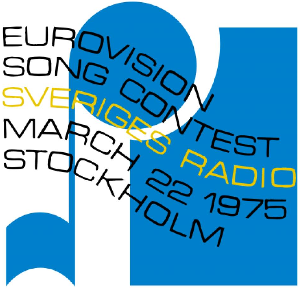
The Eurovision Song Contest 1975 was the 20th edition of the Eurovision Song Contest, held on 22 March 1975 in the Sankt Eriks-Mässan in Stockholm, Sweden. Organised by the European Broadcasting Union (EBU) and host broadcaster Sveriges Radio (SR), and presented by Karin Falck, the contest was held in Sweden following the country's victory at the 1974 contest with the song "Waterloo" by ABBA.

The Eurovision Song Contest 1996 was the 41st edition of the Eurovision Song Contest, held on 18 May 1996 at the Oslo Spektrum in Oslo, Norway. Organised by the European Broadcasting Union (EBU) and host broadcaster Norsk rikskringkasting (NRK) and presented by Ingvild Bryn and Morten Harket, the contest was held in Norway following the country's victory at the 1995 contest with the song "Nocturne" by Secret Garden.

The Eurovision Song Contest 2002 was the 47th edition of the Eurovision Song Contest. It took place in Tallinn, Estonia, following the country's victory at the 2001 contest with the song "Everybody" by Tanel Padar, Dave Benton and 2XL. Organised by the European Broadcasting Union (EBU) and host broadcaster Eesti Televisioon (ETV), the contest was held at the Saku Suurhall on 25 May 2002. The contest was presented by Estonian opera singer Annely Peebo and actor Marko Matvere. It was the first Eurovision Song Contest held in one of the former Soviet republics.
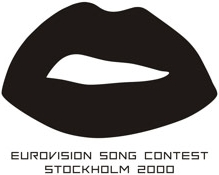
The Eurovision Song Contest 2000 was the 45th edition of the Eurovision Song Contest, held on 13 May 2000 at the Globe Arena in Stockholm, Sweden. Organised by the European Broadcasting Union (EBU) and host broadcaster Sveriges Television (SVT) and presented by Kattis Ahlström and Anders Lundin, the contest was held in Sweden following the country's victory at the 1999 contest with the song "Take Me to Your Heaven" by Charlotte Nilsson. With an audience of 13,000 people present, the 2000 contest was the largest yet seen in its history.
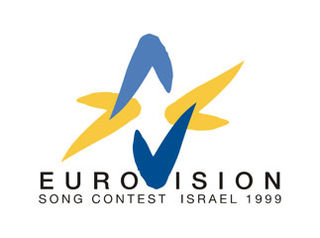
The Eurovision Song Contest 1999 was the 44th edition of the Eurovision Song Contest, held on 29 May 1999 at the International Convention Centre in Jerusalem, Israel. Organised by the European Broadcasting Union (EBU) and host broadcaster Israel Broadcasting Authority (IBA), the contest was held in the country following its victory at the 1998 contest with the song "Diva" by Dana International, and was presented by Dafna Dekel, Yigal Ravid and Sigal Shachmon.

The Eurovision Song Contest 1998 was the 43rd edition of the annual Eurovision Song Contest, held on 9 May 1998 at the National Indoor Arena in Birmingham, United Kingdom. Organised by the European Broadcasting Union (EBU) and host broadcaster the British Broadcasting Corporation (BBC) and presented by Terry Wogan and Ulrika Jonsson, the contest was held in the United Kingdom following the country's victory at the 1997 contest with the song "Love Shine a Light" by Katrina and the Waves.

Malta has participated in the Eurovision Song Contest 35 times since its debut in 1971. The contest is broadcast in Malta on the PBS channel, TVM. Malta has yet to win the contest, but is the only non-winning country to have achieved four top three results.

Luxembourg has participated in the Eurovision Song Contest 38 times since its debut at the first contest in 1956. The nation participated in all but one event between 1956 and 1993, only missing the 1959 contest. After finishing among the bottom seven countries in 1993, Luxembourg was relegated and prevented from competing in 1994. The nation did not return to the contest in 1995, and would make no further appearances over the next three decades. The country returned to the event for the first time in 31 years in 2024, qualifying for the final.

Sweden has participated in the Eurovision Song Contest 62 times since making its debut in 1958, missing only three contests since then. Since 1959, the Swedish entry has been chosen through an annual televised competition, known since 1967 as Melodifestivalen. At the 1997 contest, Sweden was one of the first five countries to adopt televoting. Sweden has hosted the contest seven times: three times in Stockholm, three times in Malmö and once in Gothenburg (1985).
Luxembourg participated in the Eurovision Song Contest 1992 with the song "Sou fräi" written by Jang Linster and Ab van Goor. The song was performed by Marion Welter and the band Kontinent, which was internally selected by the Luxembourgish broadcaster RTL Hei Elei (RTL) in March 1992 to represent Luxembourg in Malmö, Sweden. RTL organised a national final in order to select Marion Welter and Kontinent's song and "Sou fräi" emerged as the winning song on 22 March 1992 following a public postcard vote.

The Eurovision Song Contest 2013 was the 58th edition of the Eurovision Song Contest. It took place in Malmö, Sweden, following the country's victory at the 2012 contest with the song "Euphoria" by Loreen. Organised by the European Broadcasting Union (EBU) and host broadcaster Sveriges Television (SVT), the contest was held at the Malmö Arena, and consisted of two semi-finals on 14 and 16 May, and a final on 18 May 2013. The three live shows were presented by Swedish comedian and television presenter Petra Mede, being the first time only one host had presented the show since the 1995 contest. Former Swedish entrant Eric Saade acted as the green room host in the final.
